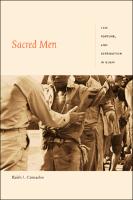Sacred Men
Law, Torture, and Retribution in Guam
Author(s)
Camacho, Keith L.
Collection
Toward an Open Monograph Ecosystem (TOME)Language
EnglishAbstract
Between 1944 and 1949 the United States Navy held a war crimes tribunal that tried Japanese nationals and members of Guam's indigenous Chamorro population who had worked for Japan's military government. In Sacred Men Keith L. Camacho traces the tribunal's legacy and its role in shaping contemporary domestic and international laws regarding combatants, jurisdiction, and property. Drawing on Giorgio Agamben's notions of bare life and Chamorro concepts of retribution, Camacho demonstrates how the U.S. tribunal used and justified the imprisonment, torture, murder, and exiling of accused Japanese and Chamorro war criminals in order to institute a new American political order. This U.S. disciplinary logic in Guam, Camacho argues, continues to directly inform the ideology used to justify the Guantánamo Bay detention center, the torture and enhanced interrogation of enemy combatants, and the American carceral state.
Keywords
Giorgio Agamben; empire; indigeneity; militarism; sovereigntyDOI
10.1215/9781478090236ISBN
9781478005667; 9781478006343; 9781478005032Publisher
Duke University PressPublisher website
https://www.dukeupress.edu/Publication date and place
Durham, 2019Classification
Indigenous peoples
Relating to Indigenous peoples


 Download
Download Web Shop
Web Shop